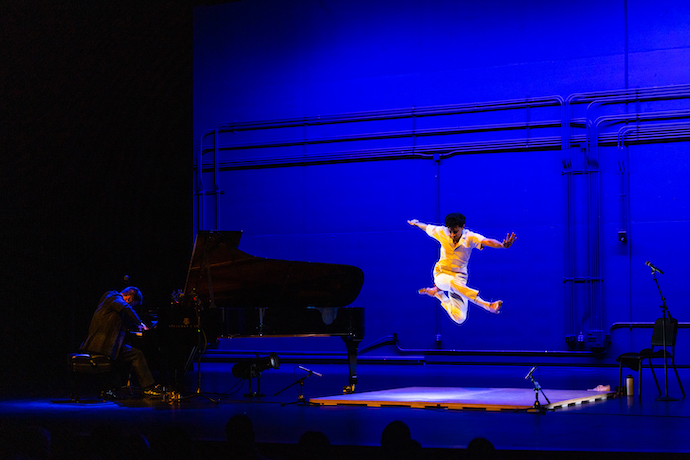
By John Short
Boston Arts Academy,
Boston
What does it mean to dance about music and to make music about dance? The Celebrity Series of Boston’s third dance event in its 2025 season, featuring Caleb Teicher and Conrad Tao’s show Counterpoint, successfully answered this question earlier this month . The show’s theme references interactive voices, in this case between music and dance, and was seamlessly woven throughout the show. Inside Boston Arts Academy’s stunning new theatre near Fenway Park, a packed and enthusiastic audience encountered a programme of four centuries of concert standards, jazz, and selections from Teicher and Tao’s previous collaboration More Forever (2020).
The stage’s minimalism, Caleb Teicher and Conrad Tao’s stark outfits, and the lighting (masterfully executed by Celebrity Series’ lighting technician Dan Clawson) crafted an immersive atmosphere to interrogate how one dances about music or makes music about dance. The concert was bookended by Tao’s tender interpretation of Johann Sebastian Bach’s delicate “Aria” from his Goldberg Variations, accompanied by Teicher’s graceful upper body gesturing and footwork that began with stirring brush strokes, but later became more percussive.
Without pause, they continued into a composition from More Forever called “Improvisation,” which began with Bach-like contrapuntal textures, but gradually incorporated jazz vocabulary. Caleb Teicher’s footwork then became more prominent, and produced tones on their dance pallet somewhat reminiscent of a bass drum. Conrad Tao then flew through Schoenberg’s short and demanding “Walzer” from his Five Piano Pieces. In introducing this piece, Tao mentioned how even today,
Schoenberg remains controversial, though the piece came and went before there was a chance for
controversy to arise.
As the stage lighting transformed into a hot red, Teicher, with a cheeky facial expression, extended their leg at a nearly ninety-degree angle before Tao tore through Ray Noble’s high-energy jazz standard “Cherokee,” tastefully incorporating elements of Art Tatum and Bud Powell’s celebrated stride covers. As the tune’s energy intensified, Teicher percussively slapped their dance pallet and clapped their hands. Following this number, Teicher without piano accompaniment performed Charles ‘Honi’ Coles and Brenda Bufalino’s dance routine, “The Coles and Bufalino Soft Shoe,” what Teicher called a ‘thirty-two bar nugget of beauty,’ that they had learnt from studying with Bufalino, a star from Boston’s one-time thriving tap-dancing scene. Poetically, Teicher suggested—while simultaneously dancing and cracking a joke or two—that tap dance requires listeners to dream with the dancer, filling the breaks with their own imagination. Teicher then repeated the thirty-two-bar passage, and in taking their advice and using my own imagination, I found the piece more expressive and expansive.
As the lights dimmed to a dark purple, Conrad Tao played Brahms’ soothing “Intermezzo No. 4 in E Major.” As the piece began to expand, Teicher returned to their pallet and made very floral upper body motion and broad foot brush strokes. I found that internalizing this piece within the body enhanced its original tranquil and contemplative meaning. With the piece’s completion, Teicher skillfully performed an unaccompanied dance and vocal duet of Mozart’s “Rondo Alla Turka,” taking many creative liberties and with a Broadway-esque bravado, which the audience loved. Our imaginations filled many gaps as Teicher knee-slapped and continuously changed registers of a melody rather demanding for the voice.
Returning to another composition from More Forever, “Swing Two,” Teicher slipped into a pair of leather sole shoes. The composition was both reminiscent of Jazz and the harmonic motion of Samba. The lighting shifted to a deep blue as Tao thundered through Gershwin’s Rhapsody in Blue arranged for solo piano, impressively reduced to maintain the original composition’s integrity, and by including improvisatory passages, added more blues than the original. Teicher hammed it up with numerous brash poses reminiscent of Greco-Roman sculpture, and crossed themselves in the pregnant pause before the
piece’s final climax.
Caleb Teicher and Conrad Tao carefully de-acclimated the audience with Ravel’s meditative “Movement de Menuet” from his Sonatine. They reprised Bach’s “Aria,” and upon a standing ovation and a demand for an encore, they played a spirited rendition of Bach’s first variation form the Goldberg Variations.
By specifically returning Austro-German absolute music to the body and incorporating playfulness to a literature often thought of as cerebral and introspective, Caleb Teicher and Conrad Tao have developed something both new and profound. ![]()